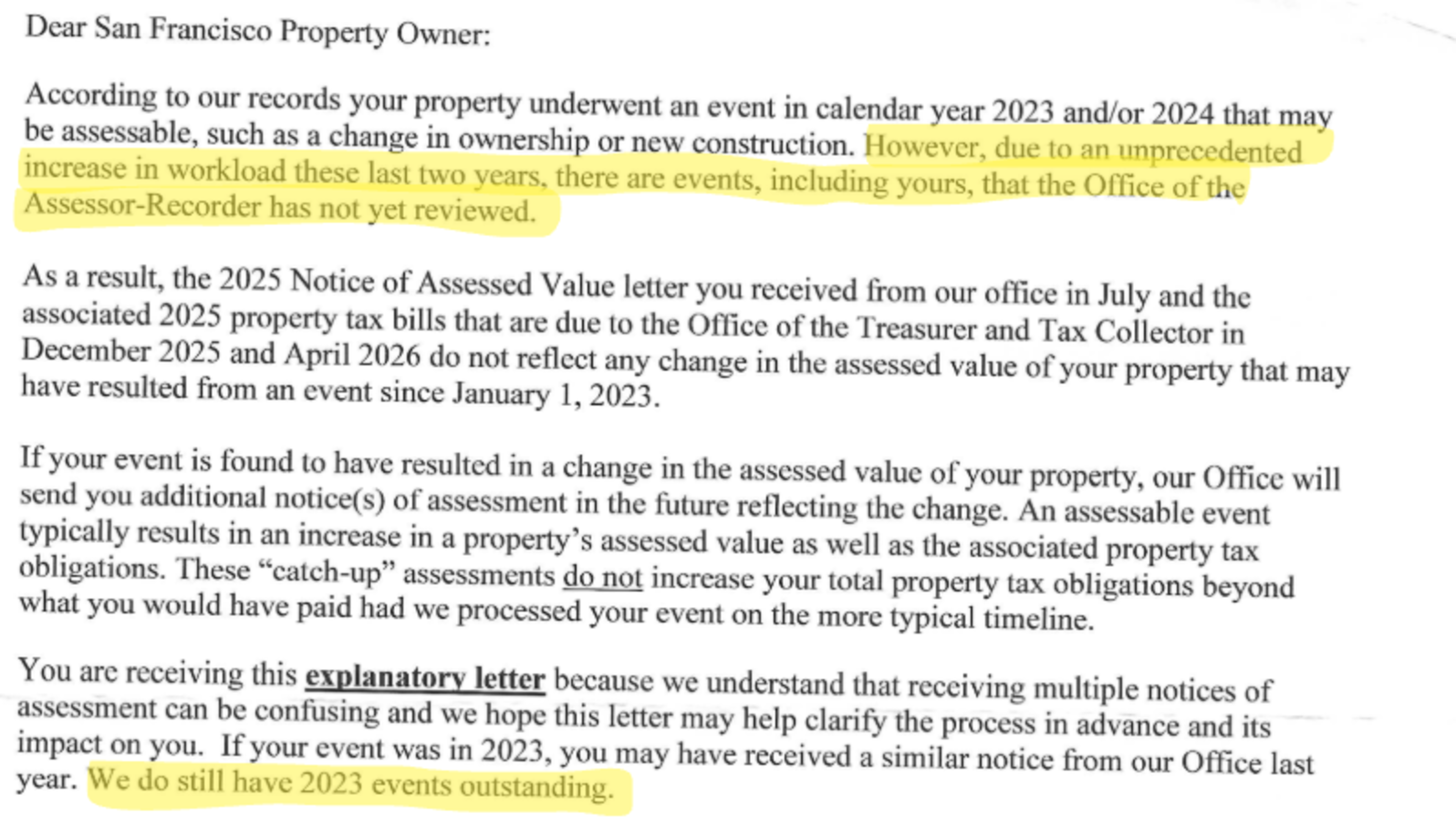A perfect storm of onerous paperwork, angry homeowners, and high-stakes deadlines is brewing for one of San Francisco’s most vital (but least sexy) government agencies.
The assessor-recorder’s office, which handles the city’s property taxes, has become overwhelmed as pandemic aftershocks continue to ripple through San Francisco. The result is growing financial peril for both taxpayers and a city staring down significant budget shortfalls.
If the city doesn’t complete an extraordinary mountain of work within a state-mandated timeline, it risks paying out more than $1 billion in property tax refunds. As the city furiously works to prevent that fate, individual taxpayers find themselves playing a financially straining waiting game.
Amid San Francisco’s exodus of residents and office workers, homeowners and commercial landlords have fought to lower their property assessments, and thus, their annual tax bills. The rationale is that reduced property values (opens in new tab) — particularly in downtown neighborhoods — should be reflected in reduced taxes.
The number of property value appeals has gone from a trickle to a tidal wave. During the 2019/2020 fiscal year, the Assessment Appeals Board processed 1,417 applications. In the 2024/2025 fiscal year, the number surged to 9,281.
By comparison, when the Great Recession tanked property values in 2009, the city saw appeals peak at 6,620.
“It’s a house of horrors administratively,” said Peter Fatooh, president of SF Property Tax Appeals and a former member of the appeals board. “The city is dealing with this huge backlog, but individuals are paying the price.”
The sheer volume of property tax refunds threatens the city’s budget, and the swell of appeals is straining the assessor-recorder’s capacity to deal with them within its state-mandated deadline. If the agency fails to evaluate an appeal within two years, then it surrenders by default to the taxpayer’s opinion of the property’s value.
At the same time that the office is dealing with the surge in people who believe they’re overpaying their property taxes, another cohort fears they’re underpaying, meaning they’ll eventually be hit with a “a massive financial asteroid (opens in new tab)” in the form of an expensive delayed tax bill.
When a property is purchased or renovated, it counts as an “assessable event” that triggers an update to its value (usually an increase). But the assessor-recorder is several years behind in processing those updates, with around 14,000 assessable events in the queue.
The office is at “an unprecedented moment,” according to Assessor-Recorder Joaquín Torres, who took the reins in 2022. “We are in both an operational and economic reality that Covid delivered to us. Those impacts cannot be overstated by any stretch of the imagination.”
High stakes, high stress
San Francisco is walking a fiscal tightrope. With two enormous backlogs pulling in opposite directions, officials have little choice: address appeals first or risk catastrophic refunds.
Often, owners put an unrealistically low value (sometimes even $0) for their property as a starting point for negotiations on an assessment appeal. The problem is that if the assessor-recorder’s office doesn’t hit the two-year timeline for addressing the request, it is forced to automatically accept that claim. The city estimates that it will be forced to refund more than $1 billion if it fails to meet its deadlines.
But even if the agency does process all its appeals within the two-year limit, the amount the city expects to refund is sizable: The controller’s office has projected that San Francisco will need to refund between about $105 million and $189 million annually for six fiscal years, totaling around $817 million.
“When you’re looking at that amount of revenue that’s at risk, this is where we have to place our resources to be most responsible,” Torres said. A majority of its nearly 60 staff members who handle property assessment are dedicated to appeals, and the city does expect to hit its two-year timelines.
Compared to that ticking time bomb, the estimated $68 million the city could get from homeowners stuck in a temporary tax holiday reads as relatively minor.
Torres noted that his office hopes to hire six staffers at the beginning of the new year to help it move through the backlog of assessable events “at a much faster rate.”
The assessor-recorder’s pileup has real impacts for taxpayers, both financially and emotionally. Those who believe they’re overpaying taxes based on outdated property values are still liable to pay the full amount to the city, even as they appeal. If they don’t pay on time, they’ll be hit with a fine. If they win an appeal, they’ll receive a refund.
Danielle Wang and her husband have appealed their condo’s property value and tax bill for three years (and released an app to help others appeal theirs too). They won their first appeal and received a refund several months later, with interest. This summer, they successfully appealed their 2024 tax assessment but have yet to receive money back.

“It’s very frustrating to not know when that refund is going to come — there’s very little transparency,” Wang said. Worse is the fact that she’s had to file separate appeals for each of the last three years, instead of getting a proactively lowered taxable value.
Fatooh believes the city’s pace is unacceptable.
One of his clients is owed a whopping $179,000 refund and has no idea when it will land. Fatooh sees a disconnect between the fines for unpaid property taxes, which come quickly, and the months it takes for the city to make good on its end.
“How is it that a taxpayer has 30 days to pay if the city says they owe them, but the city strings them out on a property tax refund?” he said. “Give me a break.” (Penalties for delinquent property taxes are a state mandate, not a city one, so the timeline for fines is technically out of SF’s hands.)
On the other side are the people who fear they are paying too little — and are nervous about the huge tax burden that will await them when the office gets around to settling the bill.
Not only will they likely have to pay more in annual taxes once they get their updated assessment, but they’ll also have to pay the difference in the years it took the city to get around to them. That means that they could be smacked with a massive tax obligation (though in some cases the city will allow (opens in new tab) them to pay in installments).
One family who purchased a property near Twin Peaks in May 2024 said they’re expecting a roughly $45,000 bill to eventually catch up with them.
They received a letter from the assessor-recorder’s office in early October explaining the backlog, and it sparked panic. Not knowing when they’ll receive an updated assessment — or what the cost will be — leaves them hesitant to start a renovation or make other major investments.

The office says it wants to be transparent with residents, even if it would prefer not to send such letters. In an effort to give taxpayers more control, the assessor-recorder’s office rolled out a calculator (opens in new tab) that estimates supplemental taxes.
Making homeowners wait for their increased tax bills — and making the city wait for its surge in tax revenue — is far from ideal.
“I know people get confused. I know that it’s frustrating. It’s certainly not a desirable place to be for us,” Torres said. “In a perfect world, that full financial obligation would be on their doorstep today.”
Only in San Francisco would a letter tallying up how much more you have to pay in taxes be a welcome relief.
